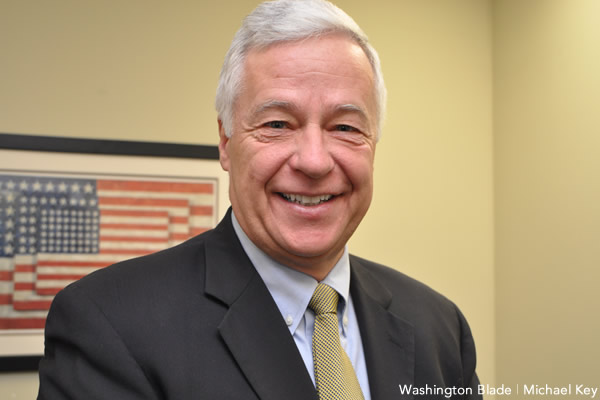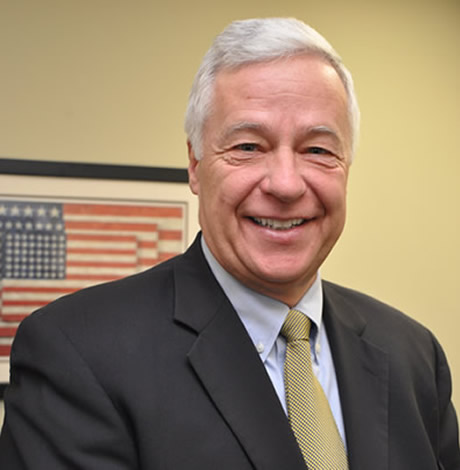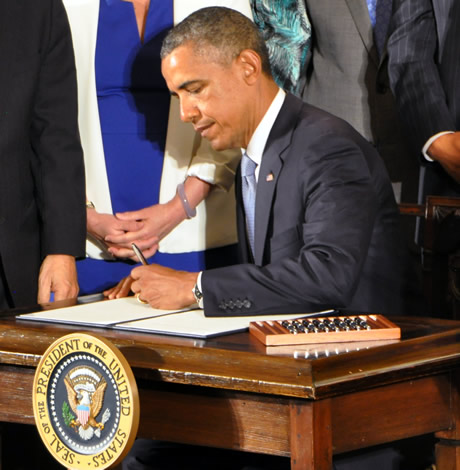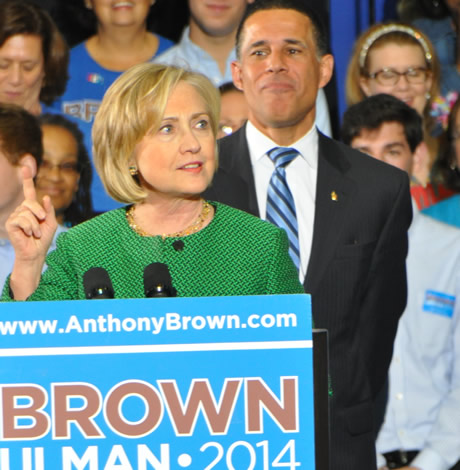National
Seeking to ‘move Maine forward’ as governor
Recently out, Michaud could make history at the ballot
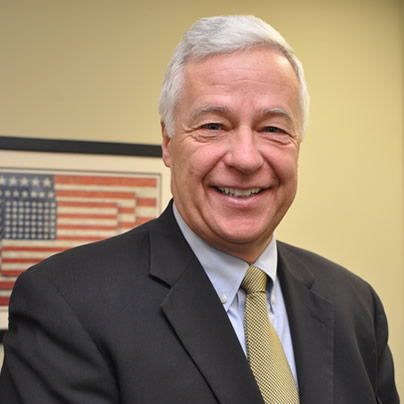
Having only come out five months ago in several editorials in Maine newspapers, Mike Michaud is new to the club in terms of out public figures.
Nonetheless, he’s on the path to achieving a goal that has never been accomplished by any openly gay person: Winning a gubernatorial election.
During an interview with the Washington Blade in the office of one of his campaign’s consultants near Capitol Hill, Michaud tried to tamp down his sexual orientation as a factor in the race, but acknowledged the significance it places on his candidacy.
“That’s not why I ran for governor, because of my sexual orientation; it’s because I want to move Maine forward,” Michaud said. “But, quite frankly, if elected, it is historic, and I think it’ll also change the tone of the debate when you look at LGBT issues, not only in Maine, but throughout the country.”
The five-term member of Congress is seeking election in a state that legalized marriage equality at the ballot in 2012 and non-discrimination protections for LGBT people in 2005 (after earlier failed attempts).
“As governor, one of the advantages I’ll have is the opportunity to talk with some of my colleagues,” Michaud said. “As a matter of fact, the National Governors Association just met this week. To sit down with some of the governors talking about LGBT issues as it might come up in their particular states is something that I’m not hesitant to do, and it’s easier talking to peer-to-peer.”
As Michaud noted, the State House recently rejected by a 89-52 vote a measure that would carve out a portion of Maine’s civil rights law to allow individuals to discriminate, including on the basis of sexual orientation and gender identity.
It’s similar to a controversial “turn away the gay” bill pending before Arizona Gov. Jan Brewer (R) that would enable individuals and businesses to refuse service based on a sincerely held religious belief.
Michaud said he would veto any such measure that might reach his desk as governor, and furthermore said he believes Brewer “absolutely” should veto the version of the bill in her state. Recalling the recent meeting in D.C. of the National Governors Association, Michaud said “that would be something I would be able to talk with her about this week if I was governor.”
The Gay & Lesbian Victory Fund and Equality Maine have endorsed Michaud’s candidacy. The Human Rights Campaign hasn’t yet officially thrown its support behind him, but is expected to announce more endorsements for Election 2014 following an upcoming board meeting.
Elise Johansen, Equality Maine’s executive director, said a win by Michaud in the gubernatorial election would be historic for the country and the state — and maintained her organization will help him achieve the victory.
“We endorsed Congressman Michaud’s campaign for governor because we strongly believe that he is the best choice to lead Maine, for the LGBT community and everyone in our state.” Johansen said. “In addition to electing a proven leader with a long history of standing with LGBT Mainers, we have the opportunity to make history by electing our nation’s first openly-gay governor.”
No other Democrats are challenging Michaud for the nomination in the race, so he’ll carry the Democratic banner in what could be a three-way race.
On the Republican side is incumbent Gov. Paul LePage, who was first elected during the Tea Party wave in 2010 and was recently dubbed by Politico as “America’s Craziest Governor.” Also in contention is Eliot Cutler, an independent who’s a perennial candidate for Maine governor.
The race will be tight. Cook Political Report rates the contest as a toss-up, while Rothenberg Political Report considers the match toss-up/lean Democrat. Nonetheless, Michaud said the polling he sees in the race is promising.
“I feel pretty good about where we’re at; we’re leading in all the polls head-to-head,” Michaud said. “With our current governor, it’s a slam dunk, with a three-way race it complicates it a little more, but I feel really good about where we’re at.”
Making an impact by being out
Although he’s served in Congress since 2003, Michaud came out in November via a series of editorials published in the Portland Press Herald, the Bangor Daily News and the Associated Press.
“It never was an issue in my campaigns before,” Michaud said. “It appears that someone was trying to make it an issue this time around, so rather than let them make an issue, I decided to come out and move forward.”
The announcement came the same week that the Senate began considering the Employment Non-Discrimination Act, but Michaud said the timing was based on his presence in Maine as well as a pending endorsement from Maine firefighters and policemen. Because those groups tend to be more conservative, the campaign announced the news so those groups wouldn’t rescind their support afterward.
Nonetheless, Michaud said his announcement had a positive impact and recalled a story in which a restaurant owner who had a gay son wanted to speak with him.
“He actually literally had tears in his eyes because his son came out five months before that as gay,” Michaud said. “But the way he came out, he needed help, he was sick and needed help. And the fact that when I came out, it really lifted the spirits of his son.”
Saying the incident made him “feel really good” as he recalled what happened, Michaud said it was just one of several of cases of individuals who have told him it made a big difference.
Now that he’s out, Michaud said he sees no evidence of his sexual orientation being an issue among the candidates in the race — although he said a Tea Party challenger to Sen. Susan Collins (R-Maine) took to Twitter and Facebook to make it an issue.
Although he could be be the first openly gay person elected as governor, Michaud won’t be the first openly gay person to serve as governor. That distinction belongs to former New Jersey Gov. Jim McGreevey, who came out as gay in 2004 amid controversy before resigning.
Michaud is also not the only openly gay person seeking to win election as a governor in 2014. In Maryland, Del. Heather Mizeur is pursuing the Democratic nomination in a contentious primary. The Maine Democrat said he’s never met Mizeur and professed that he’s unaware of McGreevey.
Heading Michaud’s gubernatorial campaign is Matt McTighe, who also ran a successful campaign in 2012 to legalize marriage equality at the ballot in Maine in addition to heading Americans for Workplace Opportunity, a coalition of groups that pushed for passage of the Employment Non-Discrimination Act in the Senate last year.
Michaud said he supported the idea of bringing marriage equality to the ballot in Maine 2012 — despite what he said were persistent concerns among Democratic leadership at the legislature the issue would hamper Democrats at the ballot.
The Maine Democrat recalled a conversation he had with McTighe and then-Equality Maine executive director Betsy Smith before the decision was made to go forward.
“They were concerned where I might fall out on this particular issue, or they just wanted my perspective,” Michaud said. “I remember telling both of them, ‘If not now, when? Because when is the right time? Because in 2014, you’ll probably have the same excuse. Well, we have the governor’s race. We have to win it back. It’s not the right time. So, when is the right time?'”
The gamble paid off. Democrats regained control of the legislature that year, and the marriage equality initiative passed by a 53-47 percent vote, making it the first state ever to approve marriage equality purely through voter-intiatied ballot initiative.
“And I’m very glad they went with the campaign when they went with it,” Michaud said. “The way it was dealt with was it did change the hearts and minds of individuals one by one, and they made the difference.”
Michaud sees opportunity for ENDA
Before Michaud could be elected governor, he’s set to complete his 10th term in office representing Maine’s 2nd congressional district in the U.S. House. One item that remains on his agenda is continued push for passage of the Employment Non-Discrimination Act.
In 2007, Michaud was among the roughly two-dozen Democrats who voted against a version of ENDA that afforded protections only on the basis of sexual orientation after gender identity-related provisions were removed.
“It should be all-inclusive,” Michaud said. “I did vote against it because it was actually weaker than Maine’s law. I wasn’t going to vote for something that was weaker than Maine’s law. I wasn’t going to vote for something that was weaker than what Maine has already had on the books. Actually, Maine Equality encouraged a ‘no’ vote on the legislation.”
Michaud said he was among the members of the LGBT Equality Caucus who participated in a January meeting first reported by the Washington Blade with Speaker John Boehner (R-Ohio) in which ENDA was a topic.
Although gay Rep. Mark Takano (D-Calif.) told the Blade that Boehner said there’s “no way,” ENDA would come up this session, Michaud offered a slightly different version of events that didn’t throw quite as much cold water on the legislation, saying a lame duck effort on the bill remains possible.
“He actually wanted some more information on it, and we’re going to get him the information,” Michaud said. “They might have already sent it over; I’m not sure yet. He said it was highly unlikely that it would happen before the election, so hopefully there is a leeway maybe after the election. Hopefully, we can take it up in the lame duck session.”
Joining other supporters of the bill who say ENDA has sufficient support to pass the Republican-controlled House, Michaud predicted the measure would pass on the floor — if only Republican leadership would allow the legislation to come up.
“When you look at the overwhelming support, I believe that they’ll get that from the Democratic caucus,” Michaud said. “We’ll definitely have Republican support. I feel comfortable in that regard. Clearly, the more advance notice, we can have on it, the more opportunities we’ll be able to convince our colleagues to support it.”
Michaud declined to comment further on the meeting because of its private nature other than to say Boehner was “very gracious to meet with us.” It was the first time Boehner met with the LGBT Equality Caucus. Michaud said that Boehner chose to meet with the caucus even before President Obama granted an audience with the lawmakers.
Meanwhile, the Maine Democrat is adding his voice to others calling on President Obama to take administrative action against LGBT workplace discrimination by signing an executive order.
“It starts that ball moving,” Michaud said. “Until we see what might happen on the House side, since the Senate already passed it. I think it’s a good step in the right direction because if we can’t get it done in Congress, at least by executive order we’ll have 20 to 25 percent of workers covered.”
Michaud said the LGBT Equality Caucus is working on gathering signatures for another letter to President Obama to encourage him to sign the executive order.
Torey Carter, chief operating officer of the Gay & Lesbian Victory Fund, said Michaud’s candidacy is significant.
“Mike Michaud is uniquely qualified to serve as the next governor of Maine,” Carter said. “He is a visionary leader that is a strong voice for fairness, freedom and equality for all Mainers. As a member of Congress, he has been an unwavering supporter of LGBT issues, and if elected he would become the nation’s first out LGBT governor.”
Pennsylvania
Malcolm Kenyatta could become the first LGBTQ statewide elected official in Pa.
State lawmaker a prominent Biden-Harris 2024 reelection campaign surrogate

Following his win in the Democratic primary contest on Wednesday, Pennsylvania state Rep. Malcolm Kenyatta, who is running for auditor general, is positioned to potentially become the first openly LGBTQ elected official serving the commonwealth.
In a statement celebrating his victory, LGBTQ+ Victory Fund President Annise Parker said, “Pennsylvanians trust Malcolm Kenyatta to be their watchdog as auditor general because that’s exactly what he’s been as a legislator.”
“LGBTQ+ Victory Fund is all in for Malcolm, because we know he has the experience to win this race and carry on his fight for students, seniors and workers as Pennsylvania’s auditor general,” she said.
Parker added, “LGBTQ+ Americans are severely underrepresented in public office and the numbers are even worse for Black LGBTQ+ representation. I look forward to doing everything I can to mobilize LGBTQ+ Pennsylvanians and our allies to get out and vote for Malcolm this November so we can make history.”
In April 2023, Kenyatta was appointed by the White House to serve as director of the Presidential Advisory Commission on Advancing Educational Equity, Excellence and Economic Opportunity for Black Americans.
He has been an active surrogate in the Biden-Harris 2024 reelection campaign.
The White House
White House debuts action plan targeting pollutants in drinking water
Same-sex couples face higher risk from environmental hazards

Headlining an Earth Day event in Northern Virginia’s Prince William Forest on Monday, President Joe Biden announced the disbursement of $7 billion in new grants for solar projects and warned of his Republican opponent’s plans to roll back the progress his administration has made toward addressing the harms of climate change.
The administration has led more than 500 programs geared toward communities most impacted by health and safety hazards like pollution and extreme weather events.
In a statement to the Washington Blade on Wednesday, Brenda Mallory, chair of the White House Council on Environmental Quality, said, “President Biden is leading the most ambitious climate, conservation, and environmental justice agenda in history — and that means working toward a future where all people can breathe clean air, drink clean water, and live in a healthy community.”
“This Earth Week, the Biden-Harris Administration announced $7 billion in solar energy projects for over 900,000 households in disadvantaged communities while creating hundreds of thousands of clean energy jobs, which are being made more accessible by the American Climate Corps,” she said. “President Biden is delivering on his promise to help protect all communities from the impacts of climate change — including the LGBTQI+ community — and that we leave no community behind as we build an equitable and inclusive clean energy economy for all.”
Recent milestones in the administration’s climate policies include the U.S. Environmental Protection Agency’s issuance on April 10 of legally enforceable standard for detecting and treating drinking water contaminated with polyfluoroalkyl substances.
“This rule sets health safeguards and will require public water systems to monitor and reduce the levels of PFAS in our nation’s drinking water, and notify the public of any exceedances of those levels,” according to a White House fact sheet. “The rule sets drinking water limits for five individual PFAS, including the most frequently found PFOA and PFOS.”
The move is expected to protect 100 million Americans from exposure to the “forever chemicals,” which have been linked to severe health problems including cancers, liver and heart damage, and developmental impacts in children.
An interactive dashboard from the United States Geological Survey shows the concentrations of polyfluoroalkyl substances in tapwater are highest in urban areas with dense populations, including cities like New York and Los Angeles.
During Biden’s tenure, the federal government has launched more than 500 programs that are geared toward investing in the communities most impacted by climate change, whether the harms may arise from chemical pollutants, extreme weather events, or other causes.
New research by the Williams Institute at the UCLA School of Law found that because LGBTQ Americans are likelier to live in coastal areas and densely populated cities, households with same-sex couples are likelier to experience the adverse effects of climate change.
The report notes that previous research, including a study that used “national Census data on same-sex households by census tract combined with data on hazardous air pollutants (HAPs) from the National Air Toxics Assessment” to model “the relationship between same-sex households and risk of cancer and respiratory illness” found “that higher prevalence of same-sex households is associated with higher risks for these diseases.”
“Climate change action plans at federal, state, and local levels, including disaster preparedness, response, and recovery plans, must be inclusive and address the specific needs and vulnerabilities facing LGBT people,” the Williams Institute wrote.
With respect to polyfluoroalkyl substances, the EPA’s adoption of new standards follows other federal actions undertaken during the Biden-Harris administration to protect firefighters and healthcare workers, test for and clean up pollution, and phase out or reduce use of the chemicals in fire suppressants, food packaging, and federal procurement.
Maine
Maine governor signs transgender, abortion sanctuary bill into law
Bomb threats made against lawmakers before measure’s passage

BY ERIN REED | On Tuesday, Maine Gov. Janet Mills signed LD 227, a sanctuary bill that protects transgender and abortion providers and patients from out-of-state prosecution, into law.
With this action, Maine becomes the 16th state to explicitly protect trans and abortion care in state law from prosecution. This follows several bomb threats targeting state legislators after social media attacks from far-right anti-trans influencers such as Riley Gaines and Chaya Raichik of Libs of TikTok.
An earlier version of the bill failed in committee after similar attacks in January. Undeterred, Democrats reconvened and added additional protections to the bill before it was passed into law.
The law is extensive. It asserts that gender-affirming care and reproductive health care are “legal rights” in Maine. It states that criminal and civil actions against providers and patients are not enforceable if the provision or access to that care occurred within Maine’s borders, asserting jurisdiction over those matters.
It bars cooperation with out-of-state subpoenas and arrest warrants for gender-affirming care and abortion that happen within the state. It even protects doctors who provide gender-affirming care and abortion from certain adverse actions by medical boards, malpractice insurance, and other regulating entities, shielding those providers from attempts to economically harm them through out-of-state legislation designed to dissuade them from providing care.
You can see the findings section of the bill here:
The bill also explicitly enshrines the World Professional Association of Transgender Health’s Standards of Care, which have been the target of right-wing disinformation campaigns, into state law for the coverage of trans healthcare:
The bill is said to be necessary due to attempts to prosecute doctors and seek information from patients across state lines. In recent months, attorneys general in other states have attempted to obtain health care data on trans patients who traveled to obtain care. According to the U.S. Senate Finance Committee, attorneys general in Tennessee, Indiana, Missouri, and Texas attempted to obtain detailed medical records “to terrorize transgender teens in their states … opening the door to criminalizing women’s private reproductive health care choices.”
The most blatant of these attempts was from the attorney general of Texas, who, according to the Senate Finance Committee, “sent demands to at least two non-Texas entities.” One of these entities was Seattle Children’s Hospital, which received a letter threatening administrators with arrest unless they sent data on Texas patients traveling to Seattle to obtain gender-affirming care.
Seattle Children’s Hospital settled that case out of court this week, agreeing to withdraw its Texas business registration in return for Texas dropping its investigation. This likely will have no impact on Seattle Children’s Hospital, which has stated it did not treat any youth via telemedicine or in person in Texas; the hospital will be able to continue treating Texas youth who travel outside of Texas to obtain their care. That settlement was likely compelling due to a nearly identical law in Washington that barred out-of-state investigations on trans care obtained solely in the state of Washington.
The bill has faced a rocky road to passage. A similar bill was debated in January, but after coming under intense attack from anti-trans activists who misleadingly called it a “transgender trafficking bill,” the bill was voluntarily withdrawn by its sponsor.
When LD 227 was introduced, it faced even more attacks from Gaines and Libs of TikTok. These attacks were followed by bomb threats that forced the evacuation of the legislature, promising “death to pedophiles” and stating that a bomb would detonate within a few hours in the capitol building.
Despite these threats, legislators strengthened both the abortion and gender-affirming care provisions and pressed forward, passing the bill into law. Provisions found in the new bill include protecting people who “aid and assist” gender-affirming care and abortion, protections against court orders from other states for care obtained in Maine, and even protections against adverse actions by health insurance and malpractice insurance providers, which have been recent targets of out-of-state legislation aimed at financially discouraging doctors from providing gender-affirming care and abortion care even in states where it is legal.
See a few of the extensive health insurance and malpractice provisions here:
Speaking about the bill, Gia Drew, executive director of Equality Maine, said in a statement, “We are thrilled to see LD 227, the shield bill, be signed into law by Gov. Mills. Thanks to our pro equality and pro reproductive choice elected officials who refused to back down in the face of disinformation. This bill couldn’t come into effect at a better time, as more than 40 percent of states across the country have either banned or attempted to block access to reproductive care, which includes abortions, as well as transgender healthcare for minors. Thanks to our coalition partners who worked tirelessly to phone bank, lobby, and get this bill over the finish line to protect community health.”
Destie Hohman Sprague of the Maine Women’s Lobby celebrated the passage of the bill despite threats of violence, saying in a statement, “A gender-just Maine ensures that all Mainers have access to quality health care that supports their mental and physical wellbeing and bodily autonomy, including comprehensive reproductive and gender-affirming care. We celebrate the passage of LD 227, which helps us meet that goal. Still, the patterns of violence and disinformation ahead of the vote reflected the growing connections between misogyny, extremism, and anti-democratic threats and actions. We must continue to advocate for policies that protect bodily autonomy, and push back against extremist rhetoric that threatens our states’ rights and our citizens’ freedoms.”
The decision to pass the legislation comes as the Biden administration released updated HIPAA protections that protect “reproductive health care” from out-of-state prosecutions and investigations.
Although the definition of “reproductive health care” is broad in the new HIPAA regulations, it is uncertain whether they will include gender-affirming care. For at least 16 states, though, gender-affirming care is now explicitly protected by state law and shielded from out-of-state legislation, providing trans people and those seeking abortions with protections as the fight increasingly crosses state lines.
****************************************************************************

Erin Reed is a transgender woman (she/her pronouns) and researcher who tracks anti-LGBTQ+ legislation around the world and helps people become better advocates for their queer family, friends, colleagues, and community. Reed also is a social media consultant and public speaker.
******************************************************************************************
The preceding article was first published at Erin In The Morning and is republished with permission.
-

 State Department3 days ago
State Department3 days agoState Department releases annual human rights report
-

 Maryland4 days ago
Maryland4 days agoJoe Vogel campaign holds ‘Big Gay Canvass Kickoff’
-

 Politics3 days ago
Politics3 days agoSmithsonian staff concerned about future of LGBTQ programming amid GOP scrutiny
-

 District of Columbia18 hours ago
District of Columbia18 hours agoCatching up with the asexuals and aromantics of D.C.

